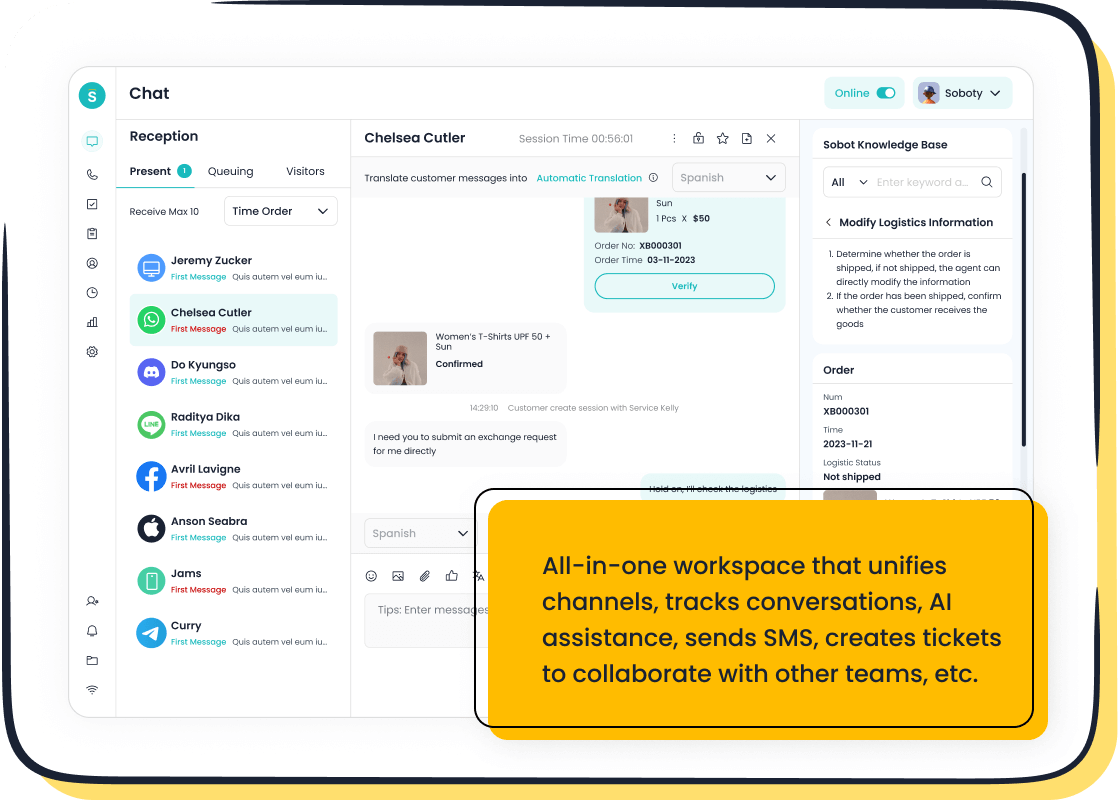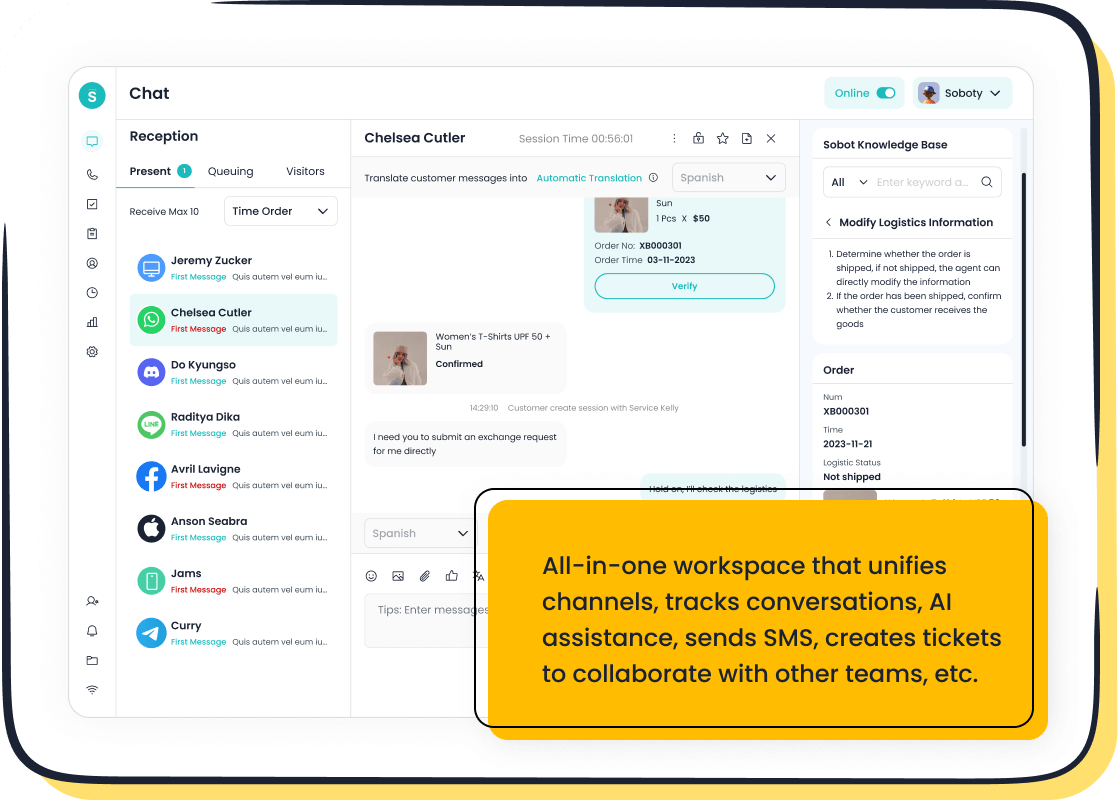AI-Powered Customer Service Trends You Need to Know

Artificial intelligence is revolutionizing how you interact with customers. By 2025, 95% of businesses using AI will cut costs and save time, while 92% will report better customer service. AI adoption is also expected to boost revenue by 32% and reduce customer service costs by 35%. These shifts highlight why staying ahead of customer service trends is essential for success. For instance, 72% of consumers now demand immediate responses, and 64% prefer resolving issues on their current platform.
Sobot, a pioneer in AI-driven customer service solutions, empowers businesses to meet these evolving expectations. With tools like its customer service suite, Sobot combines analytics, automation, and omnichannel integration to deliver seamless interactions. By leveraging these innovations, you can enhance customer satisfaction and build lasting loyalty.
Hyper-Personalization in Customer Service Trends

Defining Hyper-Personalization in Customer Interactions
Hyper-personalization takes customer service to the next level by using data and analytics to understand each customer’s unique needs, preferences, and behaviors. Unlike traditional personalization, which might involve addressing customers by name, hyper-personalization dives deeper. It tailors content, recommendations, and interactions to align with individual customer journeys. For example, companies like Nike use data from various touchpoints to create unified profiles. These profiles enable personalized promotions and real-time notifications based on user behavior. This approach ensures that every interaction feels relevant and meaningful.
Benefits for Customer Experience and Business Growth
Hyper-personalization offers significant advantages for both customers and businesses. Customers enjoy tailored services that meet their specific needs, leading to higher satisfaction. Businesses, in turn, see measurable growth. Studies show that advanced personalization strategies can boost revenue by 6% to 10%. Additionally, customers are willing to spend 38% more with brands that deliver personalized experiences. A closer look at the numbers reveals even more benefits:
| Metric | Impact |
|---|---|
| Revenue Growth | 10-15% average increase |
| Customer Loyalty | Improved through personalized experiences |
| Marketing Efficiency | Enhanced through personalization efforts |
By focusing on hyper-personalization, you can improve customer satisfaction while driving business success.

Sobot Live Chat: A Tool for Hyper-Personalized Customer Service
Sobot Live Chat empowers you to deliver hyper-personalized customer service. Its AI tools analyze customer data to provide tailored services across multiple channels, including websites, apps, and social media. The platform’s customer service suite unifies all interactions in one workspace, enabling agents to respond quickly and effectively. Features like customer segmentation and built-in analytics allow you to understand your audience better and offer precise solutions. With Sobot Live Chat, you can increase conversion rates by 38% and foster long-term loyalty. This tool ensures that every interaction feels personal, boosting both customer experience and business growth.
Emotional Intelligence in AI-Powered Customer Service
What is Emotional Intelligence in AI?
Emotional intelligence in AI refers to the ability of systems to recognize, interpret, and respond to human emotions. These systems analyze emotional cues such as voice tone, language, and even facial expressions to create meaningful interactions. For example, during the Covid-19 pandemic, emotional AI played a critical role in helping people maintain social connections through devices. This technology mimics human empathy, making interactions feel more personal and engaging. Tools like IBM’s Watson Tone Analyzer and Insight7 are commonly used to detect emotional nuances, enabling AI to respond with greater sensitivity.
In customer service, emotional intelligence allows AI to go beyond solving problems. It helps create a connection with customers by understanding their emotional states. This capability is essential for delivering a superior customer experience and fostering loyalty.
Enhancing Customer Interactions with Emotionally Intelligent AI
Emotionally intelligent AI transforms customer interactions by personalizing responses based on emotional cues. For instance, it can detect frustration in a customer’s tone and adjust its approach to de-escalate the situation. Metrics like emotional resolution rates and sentiment trajectory analysis measure how well AI addresses emotional components during interactions. Studies show that 62% of customers feel emotionally connected to brands they frequently purchase from, highlighting the importance of empathy in customer relationships.
Sobot’s AI-driven emotional intelligence tools enhance customer satisfaction by analyzing emotional cues in real time. These tools empower agents to respond with empathy, ensuring every interaction feels meaningful. By integrating analytics and automation, Sobot helps businesses improve emotional resolution rates and reduce customer agitation, leading to better outcomes.
Applications in Call Centers and Customer Success Teams
Emotionally intelligent AI is revolutionizing call centers and customer success teams. It detects emotions during calls, enabling agents to tailor their responses. This approach improves customer satisfaction and retention. Businesses using AI call center automation report higher retention rates and stronger client relationships. Metrics like emotional escalation reduction and customer emotional satisfaction provide deeper insights into the effectiveness of these systems.
Sobot’s AI solutions, including its Live Chat and Voice Call Center, excel in this area. These tools combine AI call center automation with emotional intelligence to deliver personalized support. For example, Sobot’s AI copilots assist agents by generating empathetic responses, ensuring smoother interactions. This capability not only enhances customer experience but also boosts team efficiency.
Omnichannel Integration with AI for Seamless Interactions

Understanding Omnichannel AI Integration
Omnichannel AI integration ensures that your customers experience seamless interactions across all platforms. This approach connects communication channels like websites, apps, and social media into a unified system. It allows you to provide consistent support, regardless of where the interaction begins or ends. For example, a customer might start a conversation on your website and continue it on WhatsApp without losing context. This level of integration enhances customer satisfaction by making every interaction smooth and efficient.
Research shows that integrated customer service, transactions, and order fulfillment significantly improve the omnichannel customer experience. The table below highlights the positive impact of these factors:
| Evidence Description | Impact on Customer Satisfaction |
|---|---|
| Integrated customer service significantly influences omnichannel customer experience. | Positive impact on customer satisfaction. |
| Integrated transactions significantly influence omnichannel customer experience. | Positive impact on customer satisfaction. |
| Integrated order fulfillment significantly influences omnichannel customer experience. | Positive impact on customer satisfaction. |
By adopting omnichannel AI integration, you can deliver seamless omnichannel experiences that meet modern customer expectations.
Sobot’s Customer Service Suite: A Unified Approach to Omnichannel Support
Sobot’s customer service suite offers a powerful solution for achieving seamless omnichannel experiences. It integrates all customer interactions into a single workspace, enabling your team to respond quickly and effectively. With support for multiple channels like WhatsApp, Facebook, Instagram, and Telegram, Sobot ensures no interaction is missed. Its AI-powered tools analyze customer data in real time, helping you provide personalized and efficient service.
The benefits of Sobot’s unified approach are evident in the metrics. After implementing Sobot, businesses have reported a 30% increase in agent efficiency and a 97% customer satisfaction rate. These improvements demonstrate how Sobot’s solutions can transform your customer service operations.
| Metric | Before Sobot | After Sobot | Improvement |
|---|---|---|---|
| Agent Efficiency | N/A | 30% | 30% increase |
| Customer Satisfaction (CSAT) | N/A | 97% | N/A |
By leveraging Sobot’s suite, you can streamline operations and enhance customer satisfaction.
Real-World Examples of Omnichannel AI in Action
Many companies have successfully implemented omnichannel AI to improve their customer service. For instance:
- Matahari: Unified online and offline customer data using a customer data platform (CDP). This strategy boosted email open rates by 328% and increased revenue through personalized app experiences by 356x.
- Sephora: Enhanced customer interactions in beauty retail with AI chatbots.
- HDFC Bank: Streamlined banking services and improved engagement using chatbots.
The table below highlights additional examples of successful omnichannel AI implementations:
| Company | Implementation Type | Outcome |
|---|---|---|
| Wyze | AI in Customer Service | Achieved an 88% self-resolution rate, enhancing customer experiences. |
| Mayo Clinic | AI in Healthcare Diagnostics | Improved diagnostic accuracy and expedited critical medical decisions using AI agents. |
| Tesla | AI in Autonomous Driving | Utilizes a hierarchical AI system for optimized real-time decision-making in vehicles. |
These examples illustrate how omnichannel AI integration can drive efficiency and improve customer satisfaction across industries.
Generative AI for Smarter Customer Interactions
What is Generative AI and How Does it Work?
Generative AI refers to advanced artificial intelligence that creates content such as text, images, and even videos based on input data. It uses machine learning models, particularly large language models (LLMs), to analyze patterns and generate human-like outputs. For example, tools like ChatGPT and DALL·E can craft personalized responses or design visuals tailored to specific needs. In customer service, generative AI enables real-time, context-aware interactions by understanding customer queries and generating accurate, empathetic responses.
This technology has transformed how businesses engage with customers. By automating repetitive tasks, generative AI improves productivity by 30% to 45% and reduces operational costs. Companies leveraging this technology can unlock additional revenue potential of $400 to $660 billion annually. These benefits make generative AI a game-changer for enhancing customer engagement and satisfaction.
Revolutionizing Customer Support with AI-Generated Content
Generative AI is reshaping customer support by enabling businesses to deliver faster, more personalized solutions. It powers multilingual support, ensuring that 76% of online shoppers who prefer their native language feel understood. Additionally, it facilitates video-based interactions, which are expected to drive 82% of internet traffic by 2025. This shift highlights the growing importance of AI-powered video tools in customer engagement.
Businesses using generative AI report significant improvements in customer satisfaction, with ratings increasing by 30% to 50%. For instance, UK-based Octopus Energy employs conversational AI to handle inquiries equivalent to the workload of 250 human agents. This approach not only ensures 24/7 support but also achieves higher satisfaction ratings compared to traditional methods. By integrating generative AI into your customer support tools, you can enhance accessibility and streamline operations.
| Statistic | Description |
|---|---|
| 70% | Expected percentage of customer interactions handled by AI by 2025. |
| $8 billion | Annual savings for companies deploying AI-powered chatbots by 2025. |
| 20% | Reduction in error rates for businesses using AI in customer interactions. |
Sobot Live Chat: Leveraging Generative AI for Enhanced Engagement
Sobot Live Chat harnesses the power of generative AI to elevate customer engagement. Its AI tools analyze customer data in real time, enabling agents to provide precise, context-aware responses. The platform supports multilingual communication, auto-translation, and rich messaging, ensuring seamless interactions across channels like WhatsApp, Facebook, and Telegram. These features help businesses meet the growing demand for personalized, efficient customer service.
With Sobot Live Chat, you can automate routine tasks, freeing agents to focus on complex issues. The platform’s built-in analytics provides actionable insights, helping you optimize customer interactions and improve satisfaction. By leveraging generative AI, Sobot empowers businesses to deliver smarter, more meaningful customer experiences.
Ethical Considerations in AI-Powered Customer Service
Addressing Data Privacy and Security Concerns
As AI becomes central to customer service, safeguarding data privacy and security has never been more critical. AI systems often rely on vast datasets, which, if mishandled, can lead to breaches exposing sensitive customer information. This risk underscores the importance of robust data management practices. For instance, an AI chatbot assisting with account-related issues must encrypt sensitive data to prevent unauthorized access. Without such measures, privacy breaches could erode trust and harm your brand.
"We've got a big privacy problem as our economy becomes increasingly digital... the privacy and the cybersecurity problems are becoming increasingly tied together." – Iansiti
Minimizing unnecessary data storage also reduces risks. As Iansiti points out, many businesses hoard customer data without clear purposes, increasing vulnerability to breaches. By adopting data-driven strategies that prioritize encryption and compliance, you can protect customer information while maintaining trust.
Ensuring Fairness and Transparency in AI Interactions
Fairness and transparency are essential for building trust in AI-powered customer service. Customers expect AI systems to make unbiased decisions and provide clear explanations for their actions. Transparency involves clarifying how AI processes data and ensuring its neutrality. For example, tools like AI Fairness 360 and Fairlearn help businesses identify and mitigate biases in machine learning models.
| Key Aspect | Description |
|---|---|
| Long-term reputation | Companies that uphold ethical principles build a reputation as responsible and trustworthy. |
| Aligning with societal expectations | Ethical AI aligns with societal values, emphasizing fairness and transparency, which helps avoid backlash. |
| Risk mitigation | Adhering to ethical standards reduces risks related to data misuse and biased algorithms. |
| Enhancing transparency and accountability | Transparency allows stakeholders to understand decision-making processes, building trust. |
By integrating fairness and transparency into your AI systems, you align with societal values and foster customer satisfaction.
Building Trust with Ethical AI Practices
Ethical AI practices form the foundation of proactive customer service. Customers value businesses that prioritize fairness, transparency, and data security. Research shows that 73% of tech experts worry about biased AI outcomes, while 56% express concerns over data accuracy. Addressing these issues builds trust and strengthens customer relationships.
Dr. Timnit Gebru emphasizes, "There is no such thing as neutral or unbiased data set," highlighting the need for ethical oversight. Sobot’s AI solutions incorporate robust data governance and analytics to ensure compliance and fairness. By adopting ethical practices, you not only enhance customer experience but also future-proof your business against evolving regulations.
Preparing Your Business for AI-Powered Customer Service Trends
Steps to Evaluate and Implement AI Solutions
Adopting AI solutions requires a structured approach to ensure success. Start by identifying your business needs and evaluating how AI can address them. Pilot projects offer a low-risk way to test AI technologies before full-scale implementation. For example, companies that begin with pilot programs often refine their strategies and achieve better outcomes. Leadership support also plays a critical role. When executives understand AI’s benefits, they can champion its adoption across teams.
To measure effectiveness, track metrics like response times, customer satisfaction scores, and resolution rates. Analyzing call recordings, chat transcripts, and customer feedback helps pinpoint areas for improvement. Gathering feedback from both customers and agents ensures that AI tools align with expectations. Sobot’s AI solutions simplify this process by offering built-in analytics, enabling you to evaluate performance and make data-driven decisions.
Training Teams to Work with AI-Powered Tools
Effective training ensures your team can maximize the potential of AI-powered tools. Personalized learning paths improve engagement and knowledge retention. Companies that use AI-driven training programs report a 55% increase in employee satisfaction. Walmart’s AI-powered VR training, for instance, reduced staff turnover by 20% while boosting engagement by 10%.
Sobot’s Live Chat platform supports seamless onboarding with intuitive features and real-time guidance. AI copilots assist agents during interactions, helping them adapt quickly. By integrating tools like these, you can reduce training time and empower your team to deliver exceptional customer service.
Measuring the ROI of AI in Customer Service
Measuring the ROI of AI in customer service involves tracking key metrics. Focus on customer satisfaction (CSAT), resolution time, and cost reduction. For example, businesses using AI-powered chatbots save up to $8 billion annually. Metrics like personalization effectiveness and omnichannel consistency also highlight the value of AI.
Sobot’s solutions enhance ROI by improving efficiency and customer experience. Built-in analytics provide insights into performance, helping you optimize operations. By leveraging these tools, you can achieve measurable results and justify your investment in AI.
AI-powered customer service trends are reshaping how businesses interact with customers. Hyper-personalization, emotional intelligence, and omnichannel integration are driving seamless and meaningful interactions. Generative AI enhances engagement by automating tasks and delivering smarter responses, while ethical considerations ensure trust and transparency. These trends highlight the need for businesses to adopt innovative, customer-centric solutions.
To stay competitive, start with a clear vision of how AI can create value for your organization. Build strong foundations in data and infrastructure, and focus on areas where AI can differentiate your services. Automate routine tasks, uncover patterns using analytics, and make faster decisions. Balance innovation with security and invest in continuous learning. Sobot’s solutions, like its Live Chat platform, empower you to implement these strategies effectively, ensuring your customer service remains ahead of the curve.
FAQ
What is the role of AI in improving customer service efficiency?
AI automates repetitive tasks like answering FAQs and routing inquiries, allowing agents to focus on complex issues. For example, Sobot's AI tools streamline workflows by integrating customer data and providing actionable insights. This approach reduces response times and enhances overall service quality.
How does omnichannel integration benefit customer service?
Omnichannel integration ensures seamless communication across platforms like websites, apps, and social media. Sobot's customer service suite unifies these channels into one workspace, enabling agents to maintain context and provide consistent support. This improves customer satisfaction and reduces operational inefficiencies.
Why is emotional intelligence important in AI-powered customer service?
Emotional intelligence helps AI systems recognize and respond to customer emotions. For instance, Sobot's AI tools analyze emotional cues to adjust responses, creating empathetic interactions. This capability fosters trust and strengthens customer relationships.
How can businesses measure the success of AI-powered customer service?
Businesses can track metrics like customer satisfaction scores, resolution rates, and cost savings. Sobot's built-in analytics tools provide detailed reports, helping you evaluate performance and identify areas for improvement.
What are the ethical considerations when using AI in customer service?
Ethical AI practices prioritize data privacy, fairness, and transparency. Sobot ensures compliance with regulations like GDPR and uses encryption to protect customer data. These measures build trust and safeguard your brand reputation.
See Also
Transforming Support With AI-Powered Customer Service Agents
Enhancing Efficiency Through AI Customer Service Solutions
Ten Strategies To Improve Live Chat Satisfaction Rates
